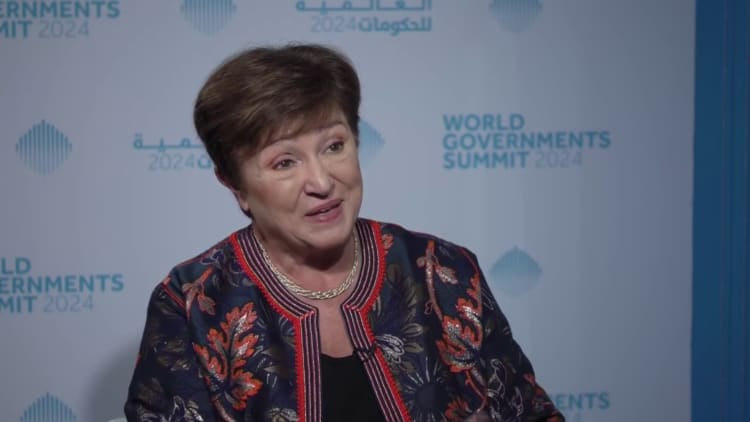Supporters of the climate protection movement Fridays for Future, including one holding a sign with the image of Russian President Vladimir Putin, in Berlin, Germany.
Sean Gallup | Getty Images News | Getty Images
China and Russia are seen as less of a threat to Western populations today than they were a year ago, as public concern focuses on non-traditional risks such as mass migration and radical Islam, a new study says.
Survey results from the Munich Security Index 2024 showed that public perception of traditional security risks remains higher than three years ago, but has fallen since 2022, the year Russia invaded Ukraine.
The findings point to a disconnect between public sentiment and political policy as world leaders meet later this week at the Munich Security Conference to discuss what organizers call a “downward trend in world politics, characterized by an increase in geopolitical tensions and economic uncertainty.
At the top of the agenda are the ongoing wars between Russia and Ukraine and Israel and Hamas, as well as NATO expansion and a possible return of Donald Trump to the White House.
However, public opinion was broadly unified on medium-term economic and geopolitical risks, with the majority of respondents in Western countries believing that China and other powers from the Global South would become more powerful in the coming decade, while Western powers were more likely to stagnate or stagnate sink.
In a survey of 12,000 people in the G7 countries as well as Brazil, India, China and South Africa, few Western respondents believed their country would be safer and more prosperous in 10 years. In contrast, most people in emerging markets thought they would be better off financially and politically.
Russia and China risk a decline
While Russia was ranked as the top threat to G7 nations last year, most of these perceived risks have since declined, the study, conducted in October-November 2023, said.
Only citizens from Great Britain and Japan still see Moscow as a top risk this year, while in Germany and Italy there has been a significant easing of concerns. This also included fading concerns about the risks of nuclear conflict and disruptions to energy supplies.
China was also viewed more positively by five G7 countries this year than last year, with the exception of Canada and Japan. Notably, however, Chinese respondents now viewed all countries except Russia and Belarus as more threatening than before. It was also the only country to name the US as a threat.
However, perceptions of non-traditional risks increased in all countries, with people around the world expressing concern about environmental threats, the risks of mass migration resulting from war or climate change, and organized crime. Environmental issues were among the top three concerns in every country except the United States
The perceived threat of radical Islam also increased significantly, although the report’s authors noted that sentiment was mostly concentrated in Europe and North America and was likely a result of the Israel-Hamas war.
Cybersecurity issues, meanwhile, are seen as the biggest risk in China and the US as both countries tighten restrictions on each other in the race for technological supremacy.
The index was accompanied by a report entitled “Lose-Lose?”, which highlighted the ongoing shift away from global cooperation and towards transactional, protectionist policies.

“As more and more countries define their success relative to others, a vicious circle of relative profit-making, loss of prosperity and growing geopolitical tensions threatens to set in motion. The resulting loss-lose dynamic is already unfolding in many policy areas and affecting different regions,” the report says.
It added that this year’s super-election cycle could further exacerbate the risks of “democratic backsliding, growing societal polarization and rising right-wing populism” and further harm international cooperation.
“Populist forces have further reinforced the sense that some actors are winning at the expense of others, as an extreme form of liberalism ‘exacerbates who wins and who loses in economic globalization,'” it continued.
The report suggested that Trump’s re-election as US president could potentially “spell the end of trusting cooperation between democratic states.” In fact, the Republican presidential candidate said Saturday he would “encourage” Russia to attack NATO allies if they fail to meet their spending commitments.
Source link
2024-02-13 06:13:07
www.cnbc.com






